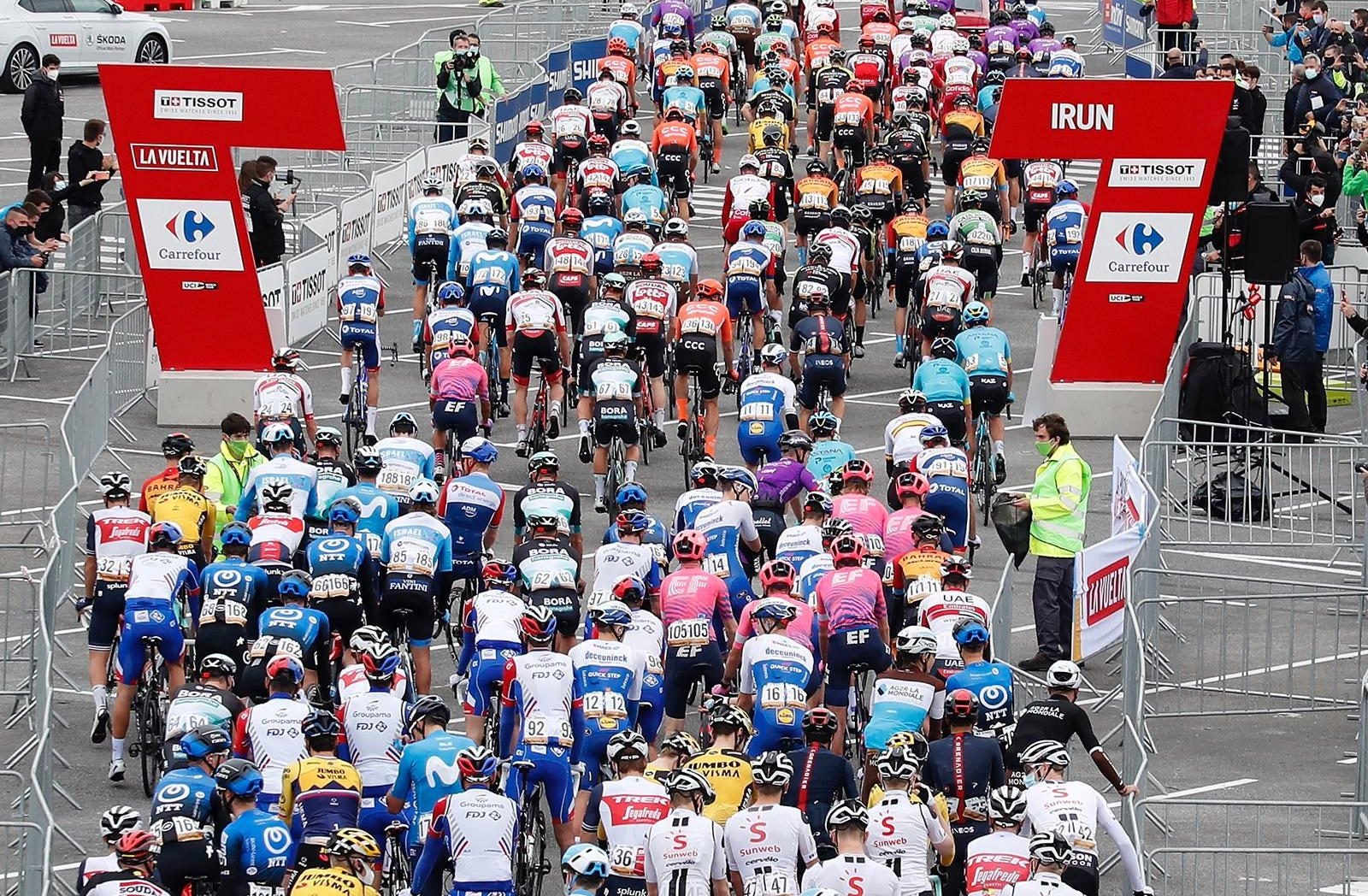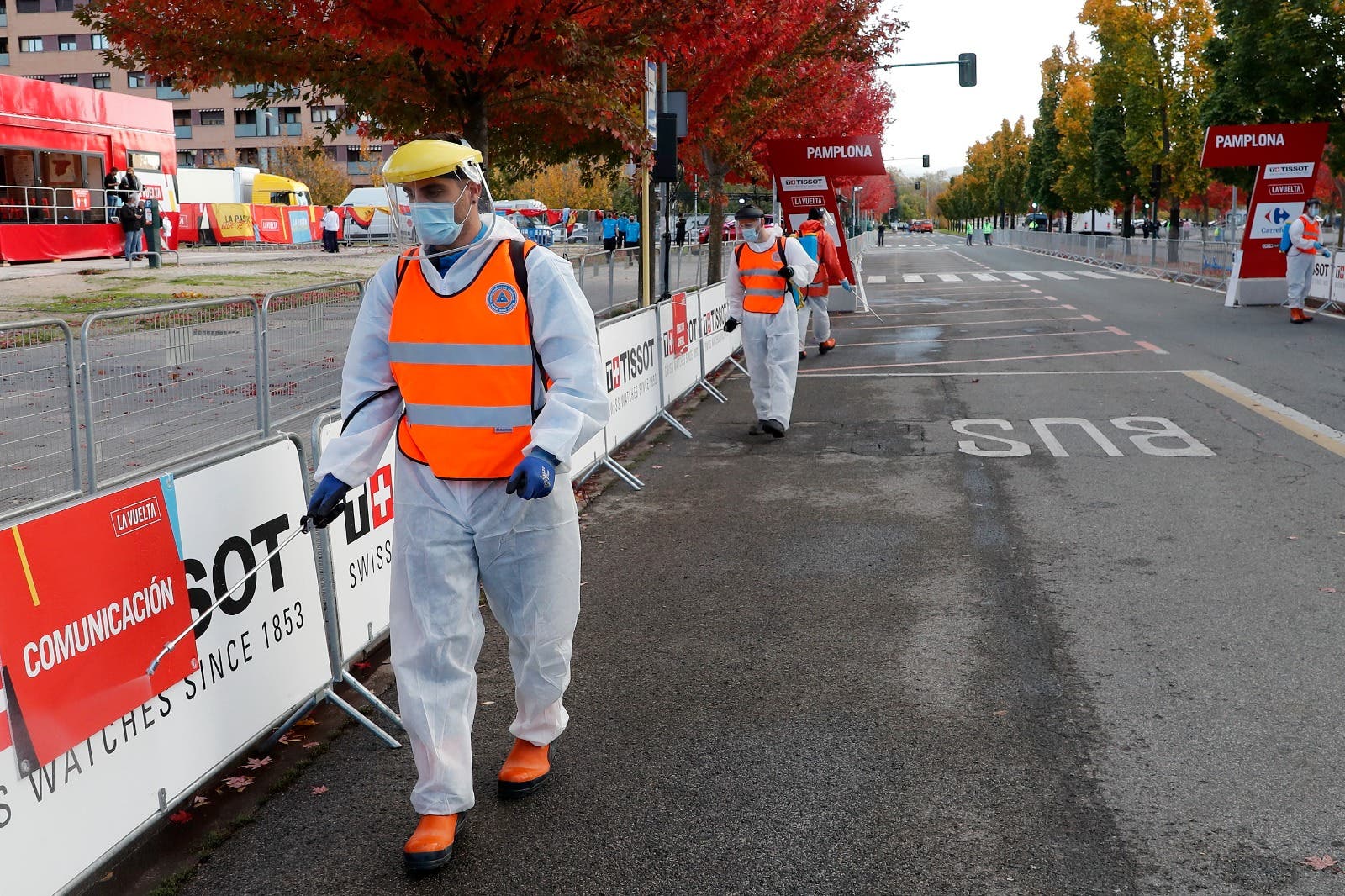Vuelta a España: Riders impressed with COVID precautions

Fencing, masks and social distancing are part of scene at the 2020 Vuelta a España. (Photo: @Photogomez Sport)
Vuelta a España officials are living up to their promise to make the race as safe as possible as the season’s final grand tour opens during worsening health conditions in Spain.
Riders in the peloton at the Spanish grand tour told VeloNews that they’re impressed with the extra steps race officials and health authorities are introducing so far during the opening days of the shortened, 18-stage race.
“I feel safer here than I do at home,” Trek-Segafredo’s Koen de Kort told VeloNews. “I’ve done quite a few races now, and this race seems extremely well-organized. I have to say I was a bit concerned coming here, but after what we’ve seen these first few days, it feels very safe.”
Those comments come after Vuelta officials promised they would unveil more safety protocols and health measures than any race in cycling’s COVID-19 era, and so far, it appears that’s true. The organization has distanced fans at the starts and finishes, as well as banned spectators from lining the major climbs. The few fans who do show up — or manage to avoid police controls — are typically masked up and respect social distancing suggestions.
Riders say steps like these give them encouragement that the race will continue, and that they will remain safe.
“There was no one on the entire Arrate climb on Tuesday,” Israel Start-Up Nation’s Rory Sutherland told VeloNews. “It was exactly what they said it would be. It feels very safe here, and the riders are thankful for that.”
Everyone was on edge as the Vuelta clicked into gear this week as the last major race of the abridged 2020 racing season. The Vuelta, which typically ends in mid-September, will run until November 8. And with the number of COVID-19 cases spiking to pre-shutdown levels in March across some parts of Spain, some are worried that the race might be canceled.
Sources tell VeloNews that the race has the ‘green light’ to continue unless there is a national “state of alarm” issued by the central government. That would see Spain go into another deep lockdown, with stay-at-home quarantines like those that were imposed this spring. So far, Spanish government officials seem hesitant to impose such draconian measures again.
Riders admitted it’s a bit odd to compete in the middle of a worsening health situation, but hoped that the race could provide a bit of hope and distraction to what everyone’s is facing right now as long as the race is conducted in a safe manner.
“I’m amazed we’re even racing in this difficult situation,” said Dan Martin (Israel Start-Up Nation), after winning Thursday’s third stage. “The organizers are doing an amazing job and don’t feel I’m at risk at all. But you can see the sacrifices that the general population and society in general are making to try to beat this virus. Restaurants are closed, and people cannot visit their families, and sometimes it feels strange that cycling continues. We have the responsibility to set a good example, but this is also our jobs, and I only hope that the race can give a bit of entertainment and pleasure to everyone who is suffering in this incredibly challenging situation.”
To give the Vuelta the best chance of making it to Madrid next month, the race organization has been working closely with national and regional health authorities to create the safest and most thorough safety protocols as possible. Vuelta officials also took lessons learned from the Vuelta a Burgos in late July, which was the first major race after a months-long lockdown.
Earlier this summer, Vuelta officials also visited the Tour de France and other races in the remade racing season to learn how other organizers were dealing with conducting a race in the middle of a world pandemic.
The Vuelta has applied those lessons, and more.
Not only is the race following the protocols suggested by the UCI and health authorities, including holding the race largely “behind closed doors,” the race has gone to the extraordinary step of asking fans to not attend at all. A publicity campaign dubbed, “Stay at Home,” is beaming that message across TV, radio, and social media channels for fans to watch the 2020 Vuelta on television. The race also canceled its publicity caravan and a finish-line expo area.
Riders say they’re noticing, and they are appreciative that the race organization is taking their health and safety seriously.
“So far, in terms of following the rules for safety and sanitation, you can see it’s being taken very seriously,” said Sutherland, racing in his final grand tour of his career. “All the riders in the peloton are commending what’s being done. The rules are being followed very carefully, and that’s a sign of respect to us, the fans, and the race.”
Like the Tour de France, the Vuelta will also impose a strict two-strikes-and-out policy, so if two riders test positive within one week, the entire team will be ejected from the race. In pre-race screenings, conducted in a mobile lab that will travel throughout the race’s itinerary, no riders tested positive for COVID-19 in thorough PCR controls of nearly 500 people inside the Vuelta’s strictest “bubble.” One staffer each from Sunweb and Bahrain-McLaren tested positive and were placed into isolation.
Riders also say they’ve been impressed with how the Vuelta hotels have been organized. Even when more than one team is checked into the same hotel, riders say they’re sufficiently separated — as well as from the general public — to feel safe.
“Right now, we’ve been in a hotel with four other teams, but I have not seen one single rider from another team since we got here,” de Kort said. “Teams are completely separated. We are on our own floors, we have our own room for dinner, and we don’t see anyone else from the race or from the public.”
That’s in sharp contrast to the opening stages of the Giro d’Italia, when riders were shocked that they were packed into hotels filled with vacationers, who were milling about without wearing masks or respecting distancing rules.
The Vuelta has also brought on extra security staffing this year to keep crowds far away from the race, as well as hired a fleet of sanitary workers to spray down barriers, podiums, and other public spaces with disinfectant each day.
“We know it’s harder and more expensive to organize the race this way, but the riders want to commend the organization,” Sutherland said. “Everyone is wearing a mask, it feels safe in the hotels, and there is big attention being paid to safety on the road, with signs posted, and making sure that things are safe, which doesn’t always happen at every race.”
The pressure is on to keep the Vuelta going. The organizer, riders, and teams all have communal interests to push the Vuelta all the way to Madrid. So far, it appears there are no corners being cut.
